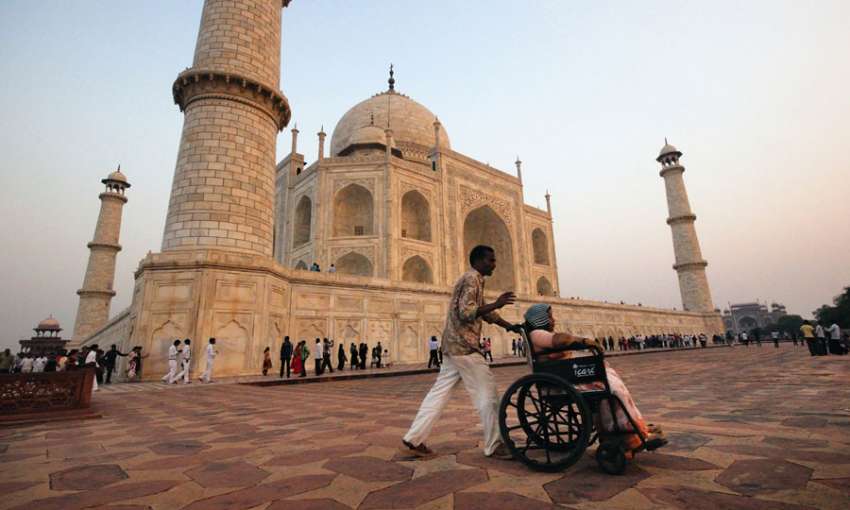It’s a great irony that sometimes people rob the persons with disabilities of a very basic human right while trying to be sensitive towards them. A recent incident of such an effort on big level was made by the Indian Prime Minister Mr. Narendra Modi by coining the nomenclature Divyang Jan (meaning someone with divine body) to be used for the persons with disabilities.
We talk about all sorts of disability rights. But the superlative nature of the word divyang robs a disabled person of the basic right of being average — just and average common person!.
All the people living with one or the other kind of disability can certainly vow on the fact that we are not blessed with any super-power. We struggle on daily basis to live a dignified life. Yes, there are many of us who have achieved great heights despite all the odds but it is not due to a gift of any super-power. The achievers put their human efforts and perseverance to be the achievers just like any other normal-bodied achievers.
While talking about the right to be average or right to be an under-achiever person; a hit Bollywood movie strikes me. Taare Zameen Par starring Amir Khan and Darsheel Safari was a great movie from cinematic point of view. But did it do justice with its theme? It appeared that the movie was going to keep its strong opinion about an inclusive society. But at the end, it actually supported the thought already prevalent in the society… a disabled person can be accepted as a respectable part of society only she is an achiever!
Why?
Why does a person with disability need to achieve something really great in order to be accepted as a respected member of the society? Why that little kid (in the movie) with learning disability had to be better than a well qualified art-teacher in drawing to be loved and accepted? Why he can’t get love without being extraordinary?

I remember an incident when I was studying in 7th standard. I had a classmate, Nivedita, who had more severe disability compared to mine and she was always carried to school by her father or brother. In school she managed everything by crawling on floor. She was a below average student. One day I was telling my mother how the children getting less marks in test were punished (including her) and how I and some other toppers were praised in the class. Suddenly my mother said why do they even educate that girl when she can’t score good marks? And then she flatly told me I would have never wasted my money on your education if you were not so brilliant.
At that moment, I thought thank god I’m good in studies. But eventually I realized there was something wrong in this thought of my mother. There were other students who secured even lesser marks than Nivedita — then why does my mother want only her to discontinue her studies? If only brilliant students have right to be educated then all of the failures should be taken out of school. If that can’t be done, then a person with disability should also be educated even if they are not the toppers.
According to the explanation of ‘Divyang’ a person who has disability in any of her/his body parts possesses a ‘divya’ or miraculous power in one or the other part of the body. She should be respected based on that body part possessing miraculous powers and be respectfully called as ‘divyang’ instead of ‘viklang’.
I admit that my legs have disability and I do not possess slightest of miraculous power in any of my body parts. I am not a super-achiever either. I can only earn a bare living just like most of the ‘normal’ people. Now what? Do I not deserve a basic respect as a human being? Should I not be included in the society? Why do people need something very shiny in me to distract their mind from my non-functional legs? Why do people need to cover my legs with something too great to give me my basic human rights?
The word divyang for persons with disabilities is as stigmatizing word as viklang.
Suppose you went to a restaurant and ordered some food. The food that is served to you is stale. So you ask it to be replaced. The waiter comes back with much more lavish plates and cutlery with that same stale food and tells you that he served you the best he could. How would you feel? The same thing is done by coining a new tag for persons with disability. We asked for an inclusive society, we asked for accessible infrastructure — but all we got is a shiny new tag of ‘Divyang Jan’.
WeCapable is firmly against the use of the word divyang for persons with disability. What is your opinion on this matter? Do share your thoughts with us in the comments section.
Use the citation below to add this article to your bibliography
"“Divyang Jan” Robs Me of My Right To Be a Common Person." Wecapable.com. Web. May 30, 2025. <https://wecapable.com/divyang-jan-robs-me-of-my-right-to-be-a-common-person/>
Wecapable.com, "“Divyang Jan” Robs Me of My Right To Be a Common Person." Accessed May 30, 2025. https://wecapable.com/divyang-jan-robs-me-of-my-right-to-be-a-common-person/
"“Divyang Jan” Robs Me of My Right To Be a Common Person." (n.d.). Wecapable.com. Retrieved May 30, 2025 from https://wecapable.com/divyang-jan-robs-me-of-my-right-to-be-a-common-person/

Leave a Reply